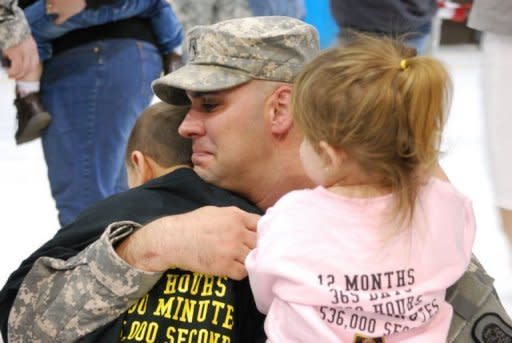Emotional homecoming for final US Iraq vets
Tears streamed unashamedly down the face of Steven Farquhar as he hugged his small children at a welcome home ceremony after his fourth -- and final -- deployment to Iraq. Farquhar, 28, was among the last US soldiers to leave Iraq after a nearly decade-long war that killed 4,487 US troops and Pentagon officials and wounded more than 32,000 others. "I'm real pleased to see the changes and the growth that happened over there between my last deployment and this one," Farquhar said as his children clung to his legs amid the crowd of happy families and well-wishers in an Iowa National Guard helicopter hanger. "It makes me so happy to see them standing on their own and it makes me real happy that we're bringing everyone home as well," he told AFP. Unlike the last lengthy US war which was fought largely by draftees in Vietnam, a relatively small number of professional soldiers and National Guard volunteers have borne the burden of leaving their families for multiple 12- to 18-month deployments in Iraq and Afghanistan. While the formal withdrawal of US forces from Iraq by December 31 will certainly ease the pressure on military families, continued operations in Afghanistan means the danger of combat zone deployment is far from over. It's an incredible stressor and a sacrifice that the general public simply cannot understand, soldiers and their families say. "I've had a lot of people say oh, well, you walked into this. Yeah, but I definitely didn't know what I'd have to overcome doing it," Dawn Gaule, 23, said as she held her boyfriend's squirming daughters on her lap while they waited for him to march into the hanger. "It's hard. And with them asking where's dad -- it's hard to explain that he's at work." Getting back into the swing of civilian life can also be hard -- especially with so many troops coming home to such bad economic times. "It's about to get a lot tougher," cautioned Captain Darrell Melrose, coordinator of the Illinois National Guard's employment initiative program. The military and service groups have developed an alphabet soup of helpful programs that were not available to vets returning from Vietnam or the brief 1990-91 Gulf War. While online video chats and e-mail have cut the distance to the battlefield, family support groups make sure that the troops don't have to worry as much about what's happening back home. They help with everything from snow shoveling and house repairs to mental health counseling. They host outings for the kids and events where parents and spouses can talk about their fears. Returning troops also go through a series of "outprocessing" and reintegration programs to help them deal with the psychological transition to civilian life and with more concrete problems like finding work, applying for college and managing their finances. "We're trying to make it so they're not afraid to ask for help," said Captain Jeremy Dugena of the Illinois National Guard's Yellow Ribbon Program. A group of Illinois Guardsmen weren't shy about talking during a recent Yellow Ribbon seminar about the problems that can come up after the honeymoon period of their homecoming ends. "Do you know all know the warning signs of when it's not alright?" asked Brian Fask, a counselor with Veterans Affairs. "If you're still drinking all the time, it's a problem," one woman said. "When you become real aggressive with friends or family," said another. Despite all the programs and support groups and well-wishers, there are still soldiers who fall through the cracks. The unemployment rate among non-active veterans who've served in the past decade was 11.1 percent in November, compared with 8.1 percent for people who had never served. And unlike the civilian population, which saw their unemployment rate drop a point from a year earlier, the unemployment rate rose 1.1 points for those vets. Federal laws are supposed to make sure that guardsmen can go back to their jobs when their tours are over, but not everyone qualifies or fills out the necessary paperwork. Others are finding that their job -- or even their companies -- have disappeared in the downturn. Robert White, 52, was working a temporary job in a factory before he deployed on his second tour. Now he's looking for work as a truck driver after having spent a year driving cargo shipments from Kuwait to Iraq. "I got back in September and I've been beating the pavement," he told AFP. "I've got a couple prospects, but nothing definite yet so I'm still searching."




